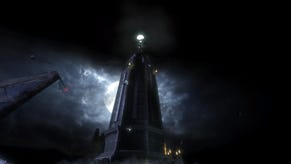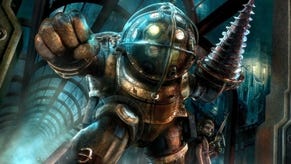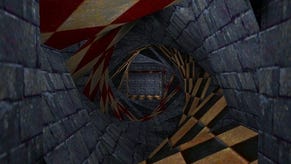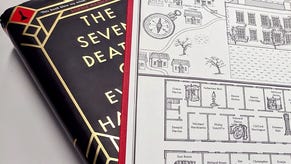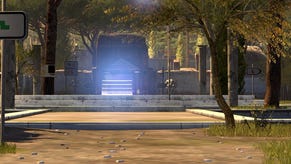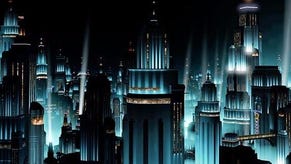BioShock 2's Jordan Thomas
Daddy's back.
Jordan Thomas is a games journalist's dream. He talks a mile a minute, hitting a dozen tangents in the process, but is consistently fascinating and entertaining - even when, as was the case with this interview, he's soundtracked by the alarming sound of a dozen dogs barking from the house next door.
While he doesn't think BioShock 2 is his magnum opus - he's clearly already planning something bigger - this is his first time fully under the spotlight, and he seems determined to make the very best of it.
I just cannot get through my day if I let the internet have a say, frankly. We have high enough standards for what we think BioShock means. Both myself and Melissa [Miller, senior producer], we worked on the first game, it is really ourselves that we have to convince. The experience of the first game was so subjective that if you talked to a hundred different people and asked them, "sooooooooo, what should be the primary features of BioShock 2?" they will tell you a hundred different f***ing things. Probably involving riding seals to freedom and so forth.
BioShock 2 specifically started out as "okay, what did BioShock 1 not do? What was not as good as it could have been?" I wanted to tell a very personal story, a kind of family conflict between three people - through the lens of Rapture, a kind of child's eye view on this magnificent city, and to show the contrast between the philosophy of rational self-interest that was embodied by Andrew Ryan and was critical to establishing the setting, and the sort of ethos of self-sacrifice that Sofia Lamb is bringing to bear. Now that we have that context, it felt like there was room for some interesting drama that comes very much from these polar extremes, and the conflicting forces between them, and the player is caught between those two impulses.
Beyond that, we had this goal to improve the game as a shooter. It felt like the first game - the story was very solid, very happy with that, the options for customising your character were also compelling, maybe not as deep as they could have been, so our goal for BioShock 2 was to celebrate your free will, I guess, both as a player and as a kind of partial author this time. That means giving you a lot more options to specialise, and it means giving you a lot more control over the narrative, in a way that didn't make sense for the first game, either in the commentary layer or in the broad 'how the hell do we get this game done, what does BioShock actually mean' questions we were answering the first time around.
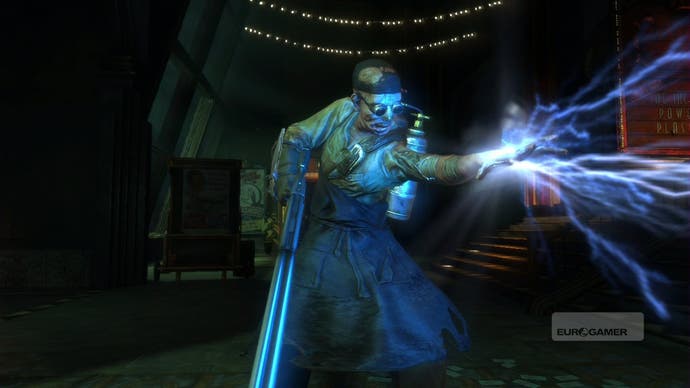
I guess I refuse to prioritise one over the other, and that's why I hire badasses... My goal with building 2K Marin, and Alyssa Finney who's the executive producer, was to put together this internal 2K studio that could deliver on the quality bar expected by the BioShock name, and also work very well with several partners. Such as 2K Australia - who are veterans of the first game, and are returning for this one, and Digital Extremes who are responsible for the multiplayer component.
From there, I guess it became about hiring somebody I could trust with the design. So we found this guy Zak McClendon, who is a brilliant sort of systems designer that we found in the Bay Area. And he took control of much of the improvement of the game as a shooter, and I think has delivered on it spectacularly, and meanwhile that gave me the headspace to focus on the BioShock canon and deliver the script that would work in tandem with those mechanics and not constantly be fighting.
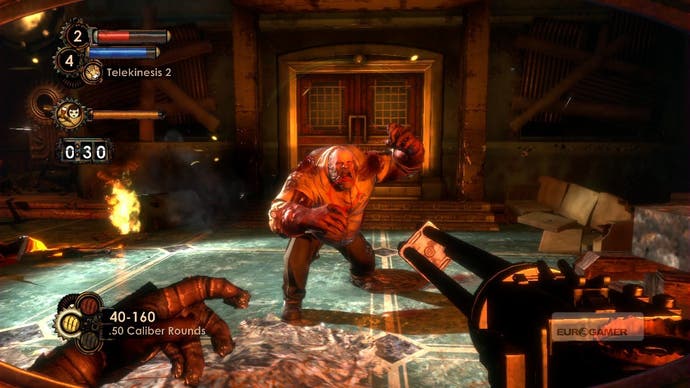
From my point of view, it was definitely not a market pressure thing. There's a section of Rapture's history that I think it best represented by multiple intelligent survival-driven agents competing over Adam. And that's the civil war of Rapture - that turned from utopia into hell underwater. Specifically, 1959-1960, after the bombing of the Kashmir by Atlas' thugs, and the subsequent open warfare between his forces and those of Ryan.
So we saw an opportunity to scratch some of the itch to see Rapture still beautiful, and also to represent accurately that part of the timeline. Beyond that though, we did hear not only market pressure but also the fans that care enough to feed back to us - some of them really want the experience to extend when they're done with the single-player. And they, like us, saw potential in the combatorial expressions that the single-player supports but does not mandate.
So, you can do all these crazy things like covering an explosive barrel with trap rivets and then hurling the entire clusterf** towards one of your enemies and watching the suffering. That, while cool, is kind of more self-gratification in single-player; we don't require it. In multiplayer, the forces of competition - very Darwinian in fact - require you to migrate around in the tool-space and learn these combos. We in fact reward some of the more difficult ones with these sort of rider trials.



